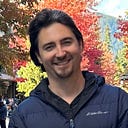Why Needs to Become the New How
So many get complexity wrong, not because they get the wrong answer, but because they ask the wrong question. This includes many scientists.
The current scientific paradigm means something very specific when it asks “how.” It is the version of“how” we have been brought up to ask. The kind we are told is logical, analytical and smart.
This version of “how” assumes that an explanation is something that connects the dots. And not just any dots; dots here represent specific things with specific roles that produce specific outputs.
We have been told that what we see must be produced by a chain of events comprised of things that deterministically bump into one another. The “how” of something, we have been told, unveils that chain of events and the things it is comprised of.
But this version of “how” only and unquestionably applies to simple things. If we make a steam engine, it applies. A rocket, it applies. It does not apply, under any circumstance, to genuinely complex things. These are the things of life, including the emergent phenomena man has “created”, like the global financial system and the internet. Things that arise from natural and near-infinite interactions.
Most people, particularly those interested in *sounding* intelligent, use the version of “how” that aligns to simple things, and apply it to complex things, which in the natural, and soon to be technological, world is also called reality.
We see this in debates about IQ. Debates about health. Debates about government intervention. Debates about the economy. Debates about education. Debates about social media. Debates about AI. Debates about trust in experts. Debates about the climate. Debates about evolution. Debates about crime. Debates about process and skills. Debates about morality, and human nature writ large.
We have reached a stage where the simplistic version of “how” is preventing us, in dramatic fashion, from making progress in any and all of the examples above.
The form of how that applies to complex reality is not the linear toy version we have been using since the Enlightenment. It is one of understood general and universal properties. It is the ability to look upon a system and recognize its characteristics, and relate those to expected outcomes. It is to argue with true rationality, which takes us away from the how, towards the why.
This is difficult for scientists to accept. The why wasn’t supposed to be part of science. But this is only because of the simplistic “how” we were using. We can indeed see why a thing must or must not be. We can describe why certain actions and decisions by people can be expected to lead to catastrophe, and others not. We can describe why AI technologies produce their outputs. We can describe why intervention is dangerous, why it makes sense to include diverse opinions, why ancestral “diets” are far healthier, and why IQ is circular nonsense.
Most people, and science, are not making progress in these areas, not because they have the wrong answers, but because they are asking the wrong question.
Why needs to become the new how.
